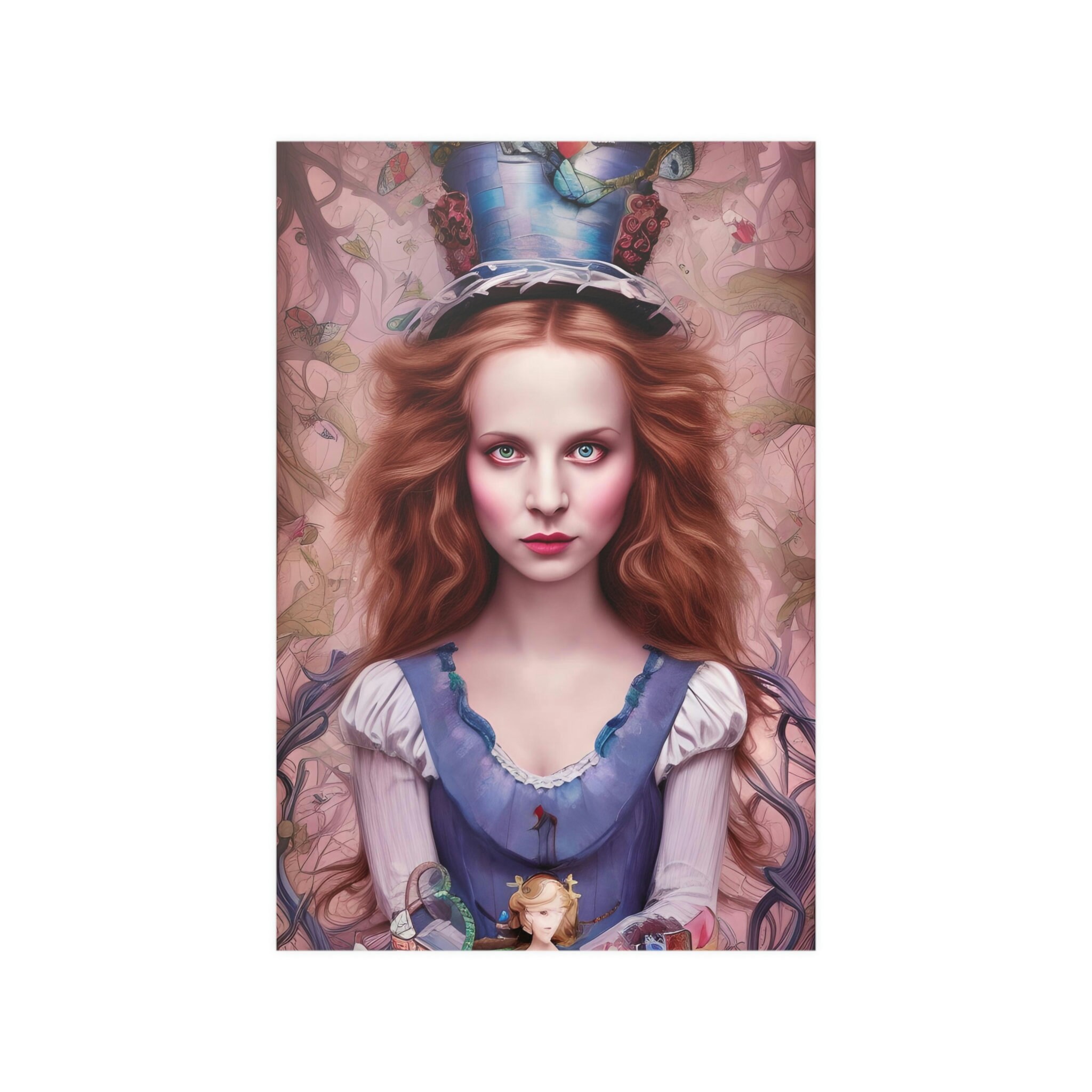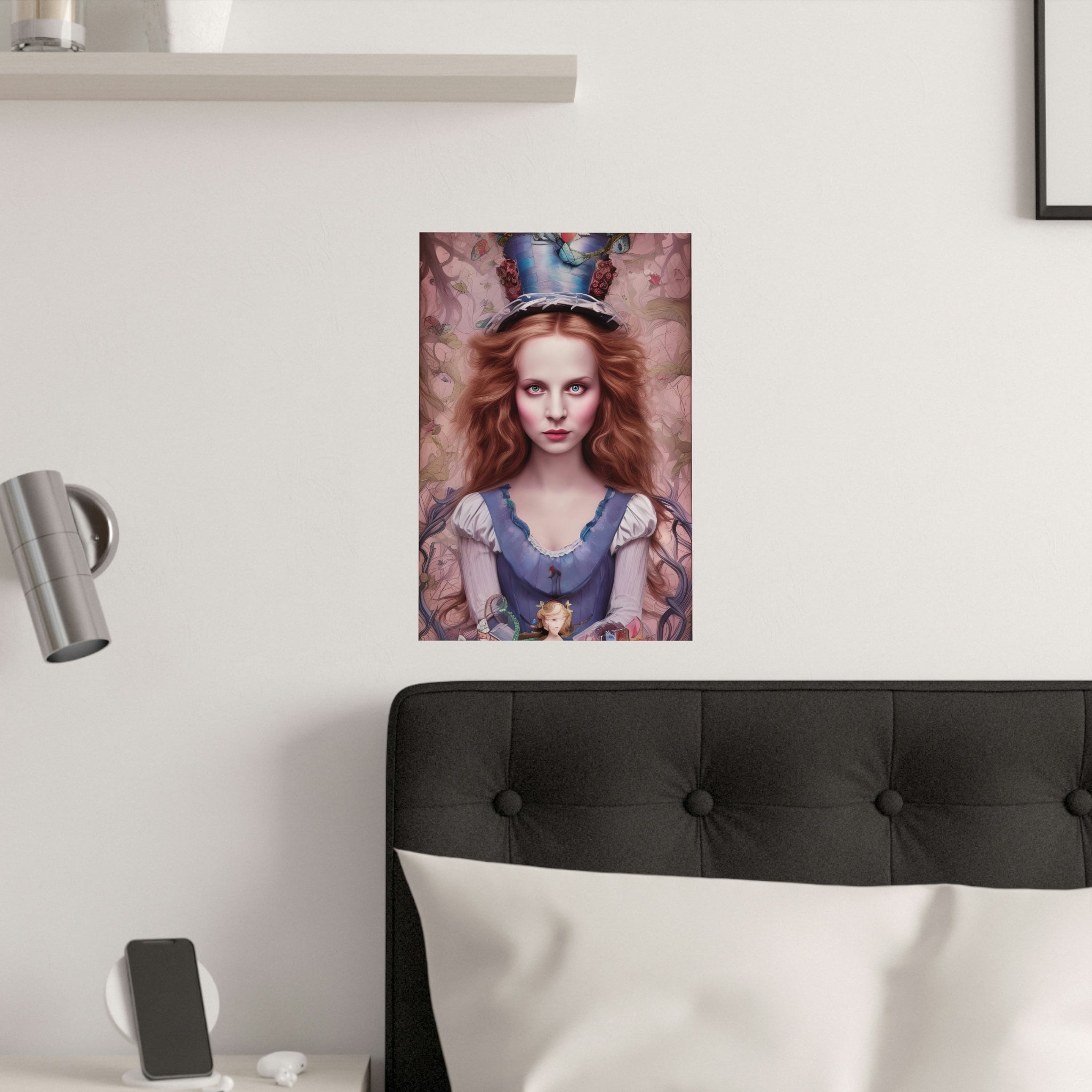Alice As The Mad Hatter, 12"x18" Satin Poster, Surreal, Alice In Wonderland
$20.00
More Alice in Wonderland: https://www.vintageartwork.com/search?q=alice
"Alice As The Mad Hatter" stands as a captivatingly eerie reinterpretation of the beloved story, Alice in Wonderland. Rather than the innocent, blond-haired girl often depicted in traditional illustrations, Alice here appears otherworldly and intense.
Her hair cascades like a burning waterfall, its vivid red hue echoing the passion and madness of the tale. Rosy cheeks pop against her pale skin, hinting at an underlying innocence lost or a fervor that now drives her. Intriguingly, heterochromia lends her a mesmerizing quality: one green eye and one blue eye pierce the viewer, drawing them into a tale that feels both familiar and unsettlingly different.
Alice's Victorian dress is hued in medium blue, lending a touch of traditional Alice aesthetic. The off-white, puffed shoulders give the dress a regal touch, contrasting starkly with the light purple sleeves that stretch into the unseen depths of the painting. A chilling detail, the splatters of blood on her chest and left sleeve, poses unanswered questions. Whose blood is it? What events led to this moment?
The worn blue top hat, reminiscent of the Mad Hatter himself, sits atop her head. Unlike the comical hats often portrayed, this one holds a dark twist, a wreath of thorns encircles its brim, signaling danger and perhaps, also suffering.
The doll’s head in her unseen hands adds another layer of eerie ambiguity to the portrait. Its face, eerily blank and mostly ground down, hints at a story of its own. Does it represent lost innocence? Or perhaps a witness to the chaos Alice has been through?
The background, with shades of light pink, offers a soft contrast to the intense emotions playing on Alice’s face. The creeping purple vines and rugged brown branches weave a story of nature's entanglement in this topsy-turvy world. A few sporadic red flowers symbolize spots of beauty and danger in this Wonderland.
Together, these elements fuse to form a portrait that feels both dreamy and nightmarish, challenging viewers to question their understanding of the Alice they thought they knew. This artwork embodies a story untold, inviting the observer to dive deeper into the rabbit hole of their imagination.
This low-glare satin poster is a perfect addition to every room! This poster is made from 210gsm satin paper which consistently reproduces image details with outstanding clarity and detail.
Sizes:
• 12" wide x 18" high
Paper specs:
• Museum grade
• 210 gsm paper
• Archival quality, which means it can be stored for a long time without turning yellow
• Low glare
Ink specs:
• Canon 12-color Aqueous ink
• Acid free, archival quality
Shipping:
• Prints are hand rolled in protective tissue paper and shipped in an extra thick triangle box/tube
Shipping from United States
Processing time
1-7 business days
Customs and import taxes
Buyers are responsible for any customs and import taxes that may apply. I'm not responsible for delays due to customs.
Payment Options
Returns & Exchanges
I gladly accept returns and exchanges
Just contact me within: 14 days of delivery
Ship items back to me within: 30 days of delivery
I don't accept cancellations
But please contact me if you have any problems with your order.
The following items can't be returned or exchanged
Because of the nature of these items, unless they arrive damaged or defective, I can't accept returns for:
- Custom or personalized orders
- Perishable products (like food or flowers)
- Digital downloads
- Intimate items (for health/hygiene reasons)
Conditions of return
Buyers are responsible for return shipping costs. If the item is not returned in its original condition, the buyer is responsible for any loss in value.
Frequently Asked Questions
What is All-Over-Print (AOP)?
All-Over Print (AOP) is a printing method that uses dye-sublimation to print a design onto polyester. During the dye sublimation process the dye is absorbed into the fabric. Since, it is not printed on the surface, like most t-shirts, it provides for a fantastic soft-to-the-touch feel and superior breathability.
AOP is a more time consuming method than screen printing or direct-to-garment (DTG) printing, so the prices are higher and the production times are longer, but the results are most definitely worth it.
Advantages of AOP:
The design won't peel off, unlike typical screen printing.
The design is part of the fabric of the item, so it will last as long as the item does.
The intensity of color is often unmatched.
What is Giclée?
Giclée (pronounced zhee-CLAY or often gee-CLAY) is a printing process that creates a museum quality, archival print. Special acid-free, paper is printed with fade resistant ink using a state-of-the-art, large format inkjet printer.
What is a gallery wrap canvas?
Gallery wrap is a style of displaying a canvas that doesn't show any visible staples or nails holding the fabric to the wooden stretcher bars. This style of canvas is intended to be hung unframed.
What is a gallery mirror wrap canvas?
Mirrored edges (mirror wrap) is used to show the whole image on the main surface, rather than printing the edges of the image on the sides (image wrap) of the canvas frame. It is usually used when there is necessary detail on the edges of the image. Image wrap is used when the focal point of the image is in the center.

